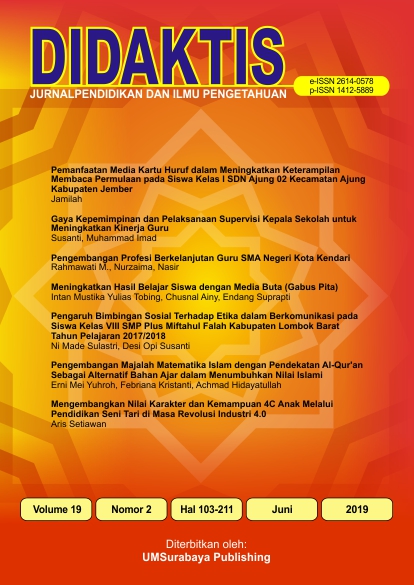Pengembangan Profesi Berkelanjutan Guru SMA Negeri Kota Kendari
Abstrak
Technological developments convey a change to all lines of people; human behavior, ways of life, transportation, habits to the way of learning is also influenced by these developments. In previous phases, education was a one-way process, where the teacher became the only source of information or knowledge for students. More than that, students first know information that occurs in other hemispheres compared to the teacher. This can happen if the teachers are unable to adapt to technological developments. The concept of sustainable professional development is a system that will create a new culture so that teachers can be aware of the changes that occur. This research explores the implementation of sustainable professional development in high schools throughout Kendari City. To obtain the data in question, the researcher used the snowball approach through interviewing, observation, and analysis data. Furthermore, the collected data is analyzed using an interactive model which includes: data reduction, data presentation, and drawing conclusions and verification. The results of this study are: 1) the teachers have an awareness to adapt to the situation, especially knowing and applying up-to-date teaching methods, of course through the development of continuous professionalism; 2) In order to achieve the quality of education, it must be supported by the development of teacher competencies such as PKB, because it will improve teacher competencies to achieve the competency standards set out in applicable laws and regulations, update teacher competencies to meet teacher needs in the development of science, technology and art to facilitate the learning process of students, increase the commitment of teachers in carrying out their main tasks and functions as professionals, foster a sense of love and pride as persons with teacher professions, enhance the image, dignity and dignity of the teaching profession in the community.
Artikel teks lengkap
Referensi
Boyt, T. E., Lusch, R. F., dan Naylor, G. (2001). The role of professionalism in determining job satisfaction in professional services: a study of marketing researchers. Journal of Service Research, 3 (4), 321-330.
Day, C., & Sachs, J. (2003). International Handbook on the Continuing Professional Development of Teachers. London: Open University Press.
Dede, Rosyada. (2007) Paradigma Pendidikan Demokratis. Kencana Prenada Media Group: Jakarta.
Energy, S. A., Region, B. S., Package, W., Partners, P., & Partners, I. (2013). Concepts for the performance and recognition of professional education for young people with practical talents in Germany - Project “ Skill Alliance Energy†- Introduction, 1–30.
Hargreaves, D. H (1994). The new professionalism: the synthesis of professional and institutional development, Teaching and Teacher Education, 10 (4), 423-438.
Hoyle, E. dan Wallace, M. (2007) Educational reform: an ironic perspective, Educational Management, Administration & Leadership, 35(1) 9–25.
Jalal, Fasli. (2001) Reformasi Pendidikan Dalam Konteks Otonomi Daerah. Adicita Karya Nusa: Yogyakarta.
Kartadinata, Sunaryo. 1998. Bimbingan di Sekolah Dasar. Alfabeta: Bandung
Makka, M. A. (2003). Pengembangan keprofesian berkelanjutan dalam penilaian prestasi kerja guru, 1–7.
Mulyasa, E. (2007). Standar Kompetensi dan Sertifikasi Guru. Rosda Karya: Bandung.
Panjaitan, Y. (2005). Strategi Pelaksanaan Pengembangan keprofesian Berkelanjutan di Sekolah. Jakarta.
Peraturan Bersama Mendiknas, Menneg PAN dan RB, Mendagri, Menkeu, dan Menag tentang Penataan dan Pemerataan Guru Pegawai Negeri Sipil, tanggal 3 Oktober 2011.
Peraturan Menteri Pemberdayaan Aparatur Negara dan Reformasi Birokrasi Nomor 16 Tahun 2009 tentang Jabatan Fungsional Guru dan Angka Kreditnya.
Peraturan Pemerintah Republik Indonesia Nomor 74 Tahun 2008 tentang Guru.
Pulungan, I. (2015). Pengembangan Keprofesian Berkelanjutan Bagi Guru Melalui Penulisan Jurnal Reflektif Mengajar. Pendidikan, 1–10.
Setiasih, O. (2010). Etika Profesi. Pendidikan, 1–31.
Sudarwan, Danim. (2011). Pengembangan Profesi Guru: Dari Induksi ke Profesional Madani. Media Perhalindo: Jakarta.
Sudarwan, Danim. (2010). Profesionalisasi dan Kode Etik Guru, Bandung. Alfabeta: Bandung.
Teacher, R., & Academy, E. M. (2010). Professional Environment for Teacher Professional develpment. Latvia.
Undang-Undang Republik Indonesia Nomor 14 Tahun 2005 tentang Guru dan Dosen.
Penulis
Hak cipta berada di tangan penulis
Artikel yang terbit dapat digunakan di bawah lisensi Creative Commons Attribution-NonCommercial 4.0 International License.


